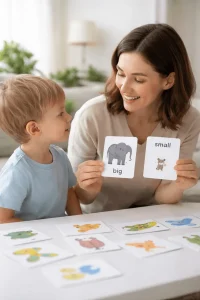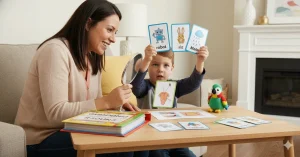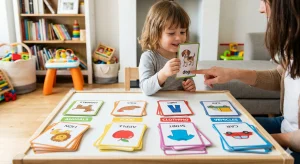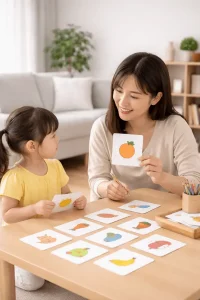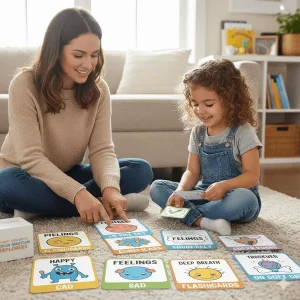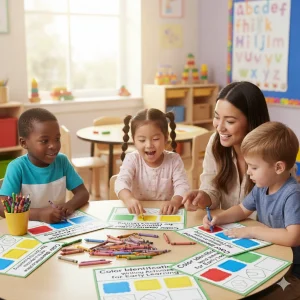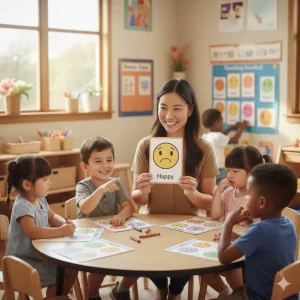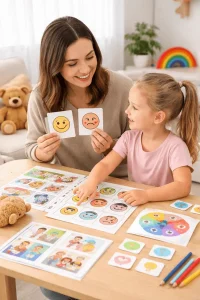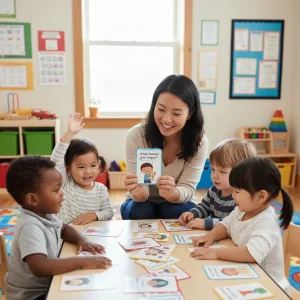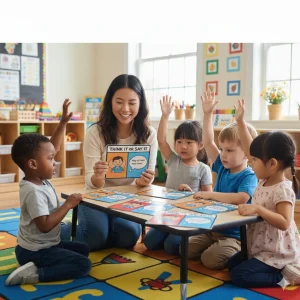How Online Therapy Supports Children Through Grief
By Wellness Hub
Last Updated: September 27, 2024
Grief can deeply impact a child’s emotional well-being, often leading to confusion and behavioral changes. Online therapy for grieving children offers a safe space where experienced therapists help them understand and express their emotions. Whether it’s coping with the loss of a loved one, a pet, or adjusting to major life changes, children benefit from personalized support that nurtures healing. With expert guidance and evidence-based techniques, online therapy empowers kids to process grief healthily, helping improve their academic performance, emotional resilience, and overall mental health. Discover how online therapy can support your child’s grief journey effectively.
Read More: Online Behavioral Therapy for Kids
Understanding Grief in Children
When a child experiences grief, it often presents differently than it does in adults. Children may not fully comprehend the permanence of loss, leading to a mix of emotions that can be overwhelming and confusing. Grief in children manifests through emotional, psychological, and even physical effects that can significantly impact their daily lives.
Emotionally, children may feel a deep sense of sadness, fear, or anger. These feelings can be intense, yet they might not know how to express them, leading to emotional outbursts or withdrawal from those around them. Psychologically, grief can alter a child’s behavior and thought patterns. They might struggle with anxiety, have trouble concentrating, or develop fears that weren’t there before. Physically, grief can show up as fatigue, changes in appetite, or frequent headaches or stomachaches. These physical symptoms are often a child’s way of processing emotions that they cannot yet articulate.
Addressing grief early in children is crucial. If left unaddressed, these feelings can linger and evolve into more significant issues, such as depression, behavioral problems, or difficulties in school. Early intervention can help prevent these long-term effects, ensuring that children learn to cope with their feelings healthily and constructively.
Common signs of grief in children include withdrawing from social activities, changes in sleeping or eating habits, and a sudden decline in academic performance. Some children may become unusually clingy, while others might display anger or irritability. Recognizing these signs early allows parents and caregivers to seek the necessary support, such as online therapy, to help the child navigate their grief.
Also read: Online Behavioral Therapy for Kids with Autism
The Role of Online Therapy in Supporting Grieving Children
Online therapy helps children deal with their grief by connecting them with a therapist through video calls, chats, or online activities. It’s a convenient way for children to get the support they need without leaving their homes.
A big benefit of online therapy is that it makes children feel safe. Being at home in a familiar place helps them open up more easily. They can talk about their feelings and work through their grief with a therapist who listens and understands.
Online therapy is also very flexible. Parents can schedule sessions that fit their family’s routine, and children can join from anywhere with an internet connection. This means therapy can happen regularly without the hassle of traveling.
Benefits of Online Therapy for Grieving Children
Online therapy offers several benefits that can make a big difference for grieving children. Here’s how it helps:
1. Emotional Support:
Online therapy provides consistent emotional support for children during their grieving process. Having regular sessions with a therapist helps children feel understood and less alone. The therapist is there to listen, comfort, and guide them through their difficult emotions, offering reassurance when they need it most.
2. Tailored Therapy Approaches:
Every child experiences grief differently, and online therapy allows for customized sessions that meet each child’s unique needs. Therapists can adjust their approach based on the child’s age, personality, and specific challenges. This personalized care helps ensure that the child receives the most effective support possible.
3. Interactive Tools and Techniques:
Online therapy often uses child-friendly tools and activities that make the sessions engaging. These might include games, drawing exercises, or storytelling. Such interactive techniques help children express their emotions in a way that feels natural to them, making it easier to process their grief.
4. Parental Involvement:
Parents play a crucial role in their child’s healing journey. In online therapy, parents can be actively involved by participating in sessions or receiving guidance on how to support their child at home. This involvement strengthens the therapy’s impact and helps the child feel more secure.
In-Person Therapy vs. Online Therapy for Grieving Children
| Aspect | In-Person Therapy | Online Therapy |
|---|---|---|
| Environment | Conducted in a clinical setting, which may feel formal or unfamiliar to children. | Takes place in the child’s own home, providing a familiar and comfortable environment that can help them feel more at ease. |
| Flexibility | Sessions are scheduled at fixed times, often requiring adherence to the therapist’s availability and office hours. | Offers flexible scheduling options, allowing sessions to be arranged around the family’s routine, making it easier to fit therapy into busy lives. |
| Parental Involvement | Parental involvement is often limited due to the nature of in-person sessions, where the focus is solely on the child during therapy time. | Parents can easily be involved in the process, either by participating in sessions or receiving real-time updates, which enhances the support provided to the child. |
| Engagement Tools | Utilizes physical tools and activities, such as toys or art supplies, which are available in the therapist’s office. | Leverages virtual tools, such as online games, drawing apps, and interactive exercises, which are accessible and engaging for children in a digital format. |
| Accessibility | Requires travel to the therapist’s office, which may be inconvenient and time-consuming, especially if the location is far from home. | Therapy sessions are accessible from anywhere with an internet connection, eliminating the need for travel and making therapy more convenient for families. |
Effective Techniques Used in Online Therapy
Online therapy for children involves several specific techniques designed to help them cope with grief. These techniques are adapted to suit the online environment, ensuring that they remain effective and engaging for young clients.
1. Play Therapy:
Play therapy allows children to express their feelings through play. In online sessions, therapists might use virtual games or activities that encourage children to explore their emotions in a safe and structured way. Play therapy helps children process their grief without needing to put their feelings into words.
2. Art Therapy:
rt therapy involves creative activities like drawing, painting, or crafting. Through online platforms, children can engage in these activities with their therapist guiding them. Art therapy is particularly effective for children who find it difficult to talk about their emotions directly. The creative process allows them to express feelings they may not fully understand.
3. Cognitive-Behavioral Therapy (CBT):
CBT is a structured approach that helps children identify and change negative thought patterns. In an online setting, therapists work with children to recognize their thoughts related to grief and develop healthier ways to manage them. This technique is especially useful for older children who can engage in more reflective conversations.
4. Storytelling and Creative Expression:
Storytelling is another powerful tool in online therapy. Therapists may encourage children to create stories that reflect their experiences, helping them process their emotions in a way that feels safe. This can be done through spoken word, writing, or even digital storytelling, where the child creates a visual narrative. Storytelling helps children make sense of their grief and see their journey from a new perspective.
5. Maintaining Routine and Normalcy:
One of the key components of online therapy is helping children maintain a sense of routine and normalcy. Regular therapy sessions become part of the child’s weekly schedule, providing stability during a time of emotional upheaval. This routine helps children feel grounded and reassured, which is vital for their healing process.
Techniques in Online Therapy and Their Benefits
| Technique | Description | Benefits |
|---|---|---|
| Play Therapy | Involves using games and play-based activities to help children explore and express their feelings. | Play therapy helps children express their emotions in a non-verbal way, making it easier for them to communicate feelings they might not yet have words for. |
| Art Therapy | Engages children in creative activities like drawing, painting, or crafting to express themselves. | Art therapy allows children to process their emotions visually, providing an outlet for feelings they struggle to verbalize. |
| Cognitive-Behavioral Therapy (CBT) | Focuses on helping children identify and change negative thought patterns related to their grief. | CBT teaches children healthier ways to think about their grief, helping them develop coping strategies and positive behaviors. |
| Storytelling | Encourages children to create and share stories, either verbally or through writing and drawing. | Storytelling helps children make sense of their experiences and emotions, giving them a narrative framework to understand their grief. |
Challenges and Considerations
While online therapy offers many benefits for grieving children, there are also some challenges to consider. Understanding these challenges and knowing how to address them can help make the most of online therapy.
1. Potential Challenges:
One common issue is screen fatigue. Spending too much time in front of a screen can be tiring, especially for children. This can make it difficult for them to stay focused during online therapy sessions. Another challenge is the lack of in-person interaction. Some children might find it harder to connect with their therapist through a screen, which could affect the effectiveness of the therapy.
2. Concerns about Technology and Privacy:
Technology and privacy are also important considerations. Parents may worry about the security of online therapy sessions or whether their child’s information is safe. Ensuring that the platform used is secure and that all data is protected is crucial to gaining parents’ trust and ensuring a safe environment for the child.
3. Strategies to Overcome Challenges:
There are ways to address these challenges and make online therapy as effective as possible. To combat screen fatigue, sessions can be kept short and include breaks if needed. Therapists can also use more interactive activities to keep children engaged. For children who struggle with the lack of in-person interaction, therapists can build trust by being warm and responsive, creating a connection even through the screen.
When it comes to technology and privacy, choosing a secure platform and explaining the privacy measures to parents can help ease concerns. At Wellness Hub, we ensure that our online therapy services prioritize both security and effectiveness, providing a safe space for children to receive the support they need.
Conclusion
Grief is tough for anyone, but it can be especially hard for children. Helping them deal with their feelings early on is important to ensure they heal and grow. Online therapy is a great way to support grieving children. It provides a safe and comfortable space where they can talk about their feelings and learn to cope with their loss. With the flexibility and convenience of online sessions, children can get the help they need from the comfort of their homes.
Parents and guardians play a key role in recognizing when their child needs help. Seeking professional support through online therapy can make a big difference. As technology improves, online therapy will continue to be a valuable resource for families. At Wellness Hub, we are dedicated to offering online therapy services that help children work through their grief and build strength for the future.
Frequently Asked Questions:
1. What is online therapy, and how does it help grieving children?
Online therapy connects children with licensed therapists through video calls, chats, or interactive activities. It provides a safe and supportive environment for children to express their feelings, learn coping strategies, and receive consistent emotional support during their grieving process.
2. What are the benefits of online therapy for children dealing with grief?
Online therapy offers several benefits for grieving children, including emotional support, tailored therapy sessions, and engaging tools like play therapy and art therapy. It also allows for parental involvement, which can strengthen the child’s healing process.
3. How does online therapy create a safe environment for children?
Online therapy allows children to participate from their own homes, where they feel safe and comfortable. This familiar setting helps children open up more easily to their therapist, making the therapy sessions more effective.
4. What techniques are used in online therapy to help children cope with grief?
Therapists use various techniques in online therapy, such as play therapy, art therapy, cognitive-behavioral therapy (CBT), and storytelling. These methods are designed to help children express their emotions and process their grief in a way that feels natural to them.
5. What are the challenges of online therapy for grieving children?
Some challenges include screen fatigue, the lack of in-person interaction, and concerns about technology and privacy. However, these challenges can be managed with shorter sessions, interactive activities, and secure platforms.
6. How can parents support their child during online therapy?
Parents can support their child by being involved in the therapy process, whether by participating in sessions or by following the therapist’s guidance on how to help their child at home. Parental involvement is crucial in reinforcing what the child learns during therapy.
7. Why is early intervention important for grieving children?
Addressing grief early helps prevent long-term emotional and psychological issues. Early intervention through online therapy provides children with the tools they need to cope with their loss in a healthy and constructive way.
8. Is online therapy as effective as in-person therapy for grieving children?
Yes, online therapy can be just as effective as in-person therapy, especially when tailored to the child’s needs. The flexibility and accessibility of online therapy make it a valuable option for many families.
9. What should I look for in an online therapy platform for my child?
Look for a secure platform that offers tailored therapy sessions, has experienced child therapists, and provides engaging tools and activities that suit your child’s age and needs.
10. How do I know if my child needs professional help to cope with grief?
If your child shows signs of withdrawal, changes in behavior, difficulty in school, or other unusual behaviors, it may be time to seek professional help. Online therapy can provide the support your child needs to navigate their grief.
About Author:
Lasya Vooturi,
Clinical Psychologist (A) & Behavioral Therapist
Lasya holds a Professional Diploma in Clinical Psychology from Amity University, where she deepened her understanding of psychological principles from March 2023 to March 2024. With over a year of dedicated experience as a Behavioral Therapist, Lasya has honed her skills in applying effective therapy techniques tailored to individual needs. Fluent in Telugu, Hindi, and English, she is adept at connecting with a diverse range of clients, ensuring comprehensive communication and understanding. Lasya’s approach is grounded in empathy and scientific rigor, making her a trusted ally in navigating mental health challenges.
Book your Free Consultation Today
Parent/Caregiver Info:
Client’s Details:
* Error Message
